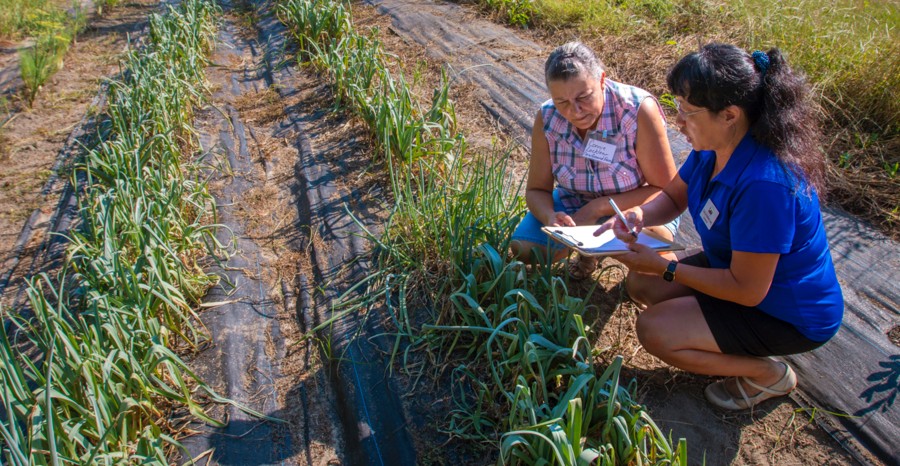N.C. A&T Professor Kathleen Liang, whose specialty is agricultural economics, works with farmer Connie Locklear on ways to plant to increase yield. Farmers should also see themselves as agricultural entrepreneurs, Liang said.
Agricultural and food industry entrepreneurs, take note: A new center focused on your specific needs is launching at North Carolina Agricultural and Technical State University.
The Agriculture Business Innovation Center (ABIC) at N.C. A&T aims to help agriculture-related businesses succeed while encouraging innovation and facilitating workforce development training.
ABIC kicks off with a free, two-day event Sept. 16-17 at the University Farm Pavilion. It’s an opportunity for agricultural leaders, entrepreneurs and community partners to collaborate, network and weigh in on what resources they need to thrive.
The center will serve as a hub, offering assistance to agriculture-based businesses nationwide, with a primary focus on small-scale farming and related enterprises. The U.S. Department of Agriculture awarded $1.92 million to the College of Agriculture and Environmental Sciences to establish the center in partnership with Kentucky State University, Alabama A&M University and West Virginia State University.

Christi Hartman of Linden, N.C. fills bottles of honey at Secret Garden Bees honey farm, which she owns with her husband Jim. The Hartmans have grown their enterprise to include shipping to grocery stores as well as selling in their farm store.
North Carolina’s agriculture and agribusiness sector contributes about $111 billion in economic impact annually, making it the state’s leading industry, according to the NC Chamber. Nationally, agriculture, food and related industries contributed $1. 5 trillion to the U.S. gross domestic product, according to the USDA Economic Research Service.
About 100 people are expected to attend the September conference, which will feature a panel discussion, entrepreneur success stories, exhibits and farm tours.
The event will “raise awareness and identify collaborative efforts to support business owners or new entrepreneurs who have limited access to technical assistance,” said Kathleen Liang, Ph.D., Kellogg Distinguished Professor of Sustainable Agriculture at N.C. A&T.
Liang and Michelle Eley, Ph.D., community and economic development specialist with Cooperative Extension at N.C. A&T, are assisting Kenrett Jefferson-Moore, Ph.D., who is leading the project. Jefferson-Moore is professor and chair of A&T’s Department of Agribusiness, Applied Economics and Agriscience Education.
“A lot of times farmers only see themselves as a business owner, they don’t see themselves as farm entrepreneurs.” Liang said. “I want to see our center to break that mindset and inject a new concept of farming, agriculture and the food industry that includes technology, information, data, science — any innovative opportunity to drive our industry to success with competitive income and benefits that will attract young people to come back to us.”
The center will provide both virtual and in-person technical assistance in areas such as food and agricultural production, business planning, market development, funding opportunities and workforce development.
“We have collaborators across the 1890 land-grant institutions,” Jefferson-Moore said, and the center anticipates working with additional universities nationwide, she said.
“With N.C. A&T serving as an administrative hub, we want to make sure that there is an established point of contact throughout the country, in particular the southeastern region, Jefferson-Moore said. “To make sure existing and prospective agricultural and food businesses get the resources that they need wherever they are.”
Students also have a vital role at the center, which includes the virtual Agribusiness Entrepreneurship Academy, said Alex Meredith, Ph.D., ABIC managing director. The academy helps students learn about and prepare for working in agriculture entrepreneurship.
Some students already are running food-related businesses, Meredith said, and ABIC can help them, too, with things like obtaining food safety certification or connecting them to a commercial kitchen.
Meredith sees ABIC as a means to help not only the individuals directly served, but also the generations that follow. “If I’m able to help small farmers effectively sustain their businesses, then that means that their children are sustained financially. They don’t have to find last-minute dollars to put a child through college,” he said.
Register
Registration for the conference room rate at the Marriott Greensboro Downtown is available here.





